Table of Contents
Remembering Bud Powell, born on this day in 1924.
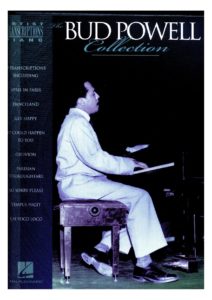
In the same way that Thelonious Monk managed to illuminate the modern jazz scene through compositions not subject to any specific model, Bud Powell (New York, September 27, 1924 – New York, July 31, 1966), dictated the fundamental keys of the new piano language without the need to cling to palpable references. Even today, he constitutes the unsurpassed technical summit of bebop piano and is remembered as the most influential musician of this movement, after Charlie Parker, but ahead of all others, including Dizzy Gillespie.
Best Sheet Music download from our Library.
His childhood was saturated with music, his older brother played the trumpet and violin professionally and his grandfather, Zachary, was the best flamenco guitarist in the United States. His father, a pianist assigned to the “stride” style, supported his early vocation and gave him his first classes.
Bud Powell’s progress was spectacular and at that time, it was common to see him perform Bach compositions and other classics with his friend, Elmo Hope. It was not until 1939, when Powell, got his first important contract with the “Sunset Royals” of the singer, Valaida Snnow, and in 1939 he recorded his first album titled “Reverse The Changers” for the “Duke” label and under the leadership of saxophonist, Frank Sokolov.
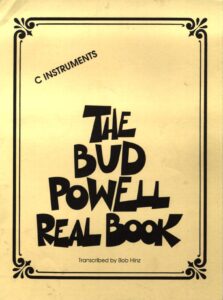
It was not until 1944, when encouraged by Thelonious Monk, he joined Cootie Williams’ orchestra and recorded a very brief solo on “Blue Garden Blues”, the first real example of his colossal talent. That same year he suffered his first arrest for public scandal, and the following years he received a brutal beating from the Philadelphia police that presumably left him forever affected. His mental disorders reproduced, and he was sent to a Long Island Psychiatric Hospital.
Please, subscribe to our Library.
If you are already a subscriber, please, check our NEW SCORES’ page every month for new sheet music. THANK YOU!
In 1946, recovered, he joined the small combo of the double bassist, John Kirby, and by chance this small group was hired at Minton’s Playhouse in Harlem, the “temple” of bebop where Powell came into contact with the leadership of that movement. , which allowed him to participate between 1946 and 1947 in a good number of jam sessions with Dexter Gordon, Jay Jay Johnson, Sonny Stitt, Kenny Clarke and Sarah Vaughan, among others.
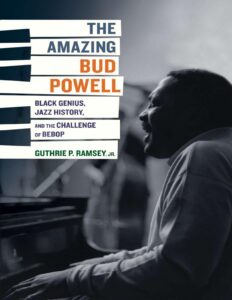
His debut as a leader came on January 10, 1947, for the small Three Deuces label, and in May of that year, he recorded the only studio record for the Savoy with Charlie Parker. A long two-year hiatus, spent mostly in the “Creedmore Sanatorium”, where he even received electroshock treatment, gave way, paradoxically, to his most fertile and artistic period. Starting on August 8, 1949, under the supervision of Alfred Lion and Francis Wolf, Bud Powell left in the coffers of the Blue Note label another vision of modern pianism perfectly compatible with the one that Thelonious Monk had contributed just two years earlier.
Once again admitted for seventeen months in another Psychiatric Hospital, when he was discharged in February 1953, he formed a stable trio with the double bassist, George Duvivier, and the drummer, Art Taylor.
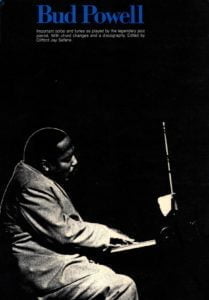
On May 15, 1953, a historic event occurred in the professional life of Bud Powell. Along with Charlie Parker, Dizzy Gillespie, Charles Mingus and Max Roach, he participated in a massive concert held at Massey Hall in Toronto, Canada, considered the swan song of bebop and perhaps the best jazz concert of all time. From then on, Powell began to enter a phase of profound, almost irreversible mental deterioration, but in 1956 he toured Europe with Miles Davis, Lester Young and Milt Jackson’s Modern Jazz Quartet. He visited the old continent again in 1959, but this time he stayed for five years. Altevia Edwards, better known as “Buttercup”, accompanied him and chose Paris as his place of residence.
Awarded the honors of a jazz great, he formed a regular trio known as the “Three Bosses” with double bassist, Pierre Michelot, and drummer, Kenny Clarke, who were the main attraction at the Parisian club, “Blue Note.” It was an important period of his life thanks to the care provided to him by Francis Paudras, an extraordinary jazz fan and later author of Powell’s biography “The Dance Of The Infidels.” But suffering from acute tuberculosis, unable to give up drinking, and homesick for New York, Bud Powell returned to the United States. His reappearance in the legendary “Birdland” caused one of the sweet moments of his career. Seven minutes of uninterrupted applause showed that his fans had not forgotten him, but that reappearance was a cruel mirage. His last two years were spent in an apartment in Brooklyn accompanied by his daughter Celia.
Almost at the end of his life, he participated in 1965 in two concerts held at Town Hall and Carnegie Hall, the latter in honor of the tenth anniversary of the death of Charlie Parker, but on July 31, 1966 he died at the Kings. County Hospital” in Brooklyn. More than five thousand people spontaneously took to the streets to honor him and at his funeral, Barry Harris and Lee Morgan played in his honor. As Francis Paudras said: «…. Bud Powell had two personalities. One drove him to fight and overcome his problems, to play and create music. The other dragged him to self-destruction, to an absolute lack of self-respect and the latter would win the game.
In 1986, the French film director, Bertrand Tavernier, produced an extraordinary film that captures Bud Powell’s Parisian period with absolute neatness and fidelity. His film: “Round Midnight”, performed in its starring role by saxophonist, Dexter Gordon, is one of the great films related to jazz.
Bud Powell – Anthropology (1962) LIVE
Bud Powell – piano Niels-Henning Orsted Pedersen – bass Jorn Elniff – drums Live from Café Montmartre, Copenhagen, early 1962.
Bud Powell biography on Wikipedia.
Browse in the Library:
| Artist or Composer / Score name | Cover | List of Contents |
|---|---|---|
| Beethoven – Moonlight Sonata | ||
| Beethoven – Moonlight Sonata 1st Mov. Guitar arr. with TABs |
 |
|
| Beethoven – Moonlight Sonata 1st Mov. Guitar arr. with TABs.mscz | ||
| Beethoven – Ode to joy – Piano arr. | Beethoven – Ode to joy – Piano arr. | |
| Beethoven – Ode To Joy (Piano solo arr.) |
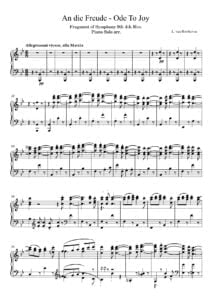 |
|
| Beethoven – Piano concerto 4 (Theme Easy piano solo) |
 |
|
| Beethoven – Piano Concerto 4 (Theme Easy Piano Solo) (Musescore File).mscz | ||
| Beethoven – Piano Concerto No 4 in G Op 58 (arr. for 2 pianos) | Beethoven – Piano Concerto No 4 | |
| Beethoven – Sonata No 23 Op 57 (Appassionata) Piano Solo (Musescore File).mscz | ||
| Beethoven – Sonata No. 8 Op. 13 Pathétique (Musescore File).mscz | ||
| Beethoven – Sonata Pathétique arr. for Guitar (Piano Sonata no. 8 in C minor op. 13 ) | Beethoven – Sonata Pathétique arr. for Guitar (Piano Sonata no. 8 in C minor op. 13 ) | |
| Beethoven – Sonata Pathétique arr. for Guitar (Piano Sonata no. 8 in C minor op. 13 ).mscz | ||
| Beethoven – Sonate Op 111 – Arietta (Liszt) |
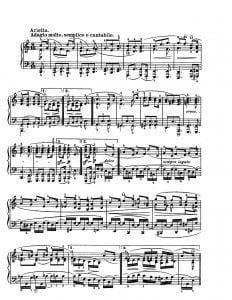 |
|
| Beethoven – Symphony n. 9 D 2H Pauer |
 |
|
| Beethoven – Symphony No. 5 (1st movement) Piano solo arr. |
 |
|
| Beethoven – Symphony No. 7 2nd Movement Piano Solo Arr. | Beethoven – Symphony No. 7 2nd Movement Piano Solo Arr. | |
| Beethoven – Symphony No. 9 3rd movement arr. for piano solo by Ernst Pauer | Beethoven – Symphony No. 9 3rd movement arr. for piano solo by Ernst Pauer | |
| Beethoven 2 cadenzas from Piano Concerto n 4 op 58 (arr. piano solo by Beethoven) | Beethoven 2 cadenzas from Piano Concerto n 4 | |
| BEETHOVEN ADAGIO from Piano Concerto Eb arr. piano solo |
 |
|
| Beethoven Analyse Pathetique | Beethoven Analyse Pathetique | |
| Beethoven by George Alexander Fischer (1905) Book |
 |
|
| Beethoven Duo For 2 Flutes Woo 26 (Musescore File).mscz | ||
| Beethoven Egmont Ouverture Piano solo Arr. Henselt |
 |
|
| Beethoven Egmont Overture Opus 84 Piano Solo arr. sheet music | Egmont Overture Opus 84 Beethoven 1st page | |
| Beethoven Fantasia G Minor Op.77 |
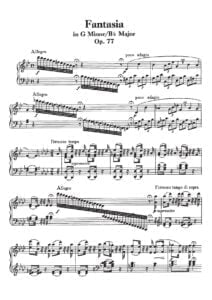 |
|
| Beethoven Fingerpicking For Guitar Solo with TABs |
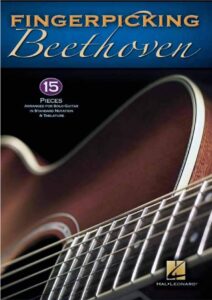 |
Beethoven Fingerpicking For Guitar Solo with TABs |
| Beethoven His Spiritual Development by J.W.N. Sullivan (Book) 1936 |
 |
|
| Beethoven L.V. Op 68 SYMPHONY VI arr. for 2 pianos |
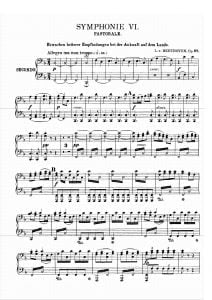 |
|
| Beethoven Leonore Overture No. 3 Piano Solo |
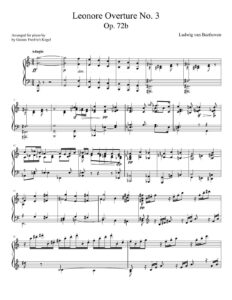 |
|
| Beethoven Leonore Overture No. 3 Piano Solo Musescore File.mscz | ||
| Beethoven Liszt 5th Symphony Piano Solo arr (Complete) |
 |
|
| Beethoven Liszt 5th Symphony Piano Solo arr.mscz | ||
| Beethoven Liszt – Symphony no. 9, 4th Movement Piano Solo arr. |
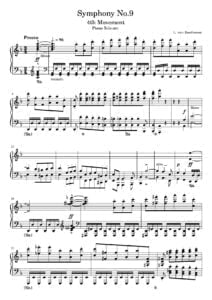 |
|
| Beethoven Liszt – Symphony No.9 4th Movement (Musescore File).mscz | ||
| Beethoven Liszt Marche Funebre |
 |
|
| Beethoven Liszt Symphony No. 9 – 1st Movement (S. 464) Piano Solo arr. | Beethoven_Liszt Symphony No. 9 – 1st Movement (S. 464) – Franz Liszt | |
| Beethoven Liszt Symphony No. 9 – 2nd Movement (S. 464) Piano Solo arr. | Beethoven_Liszt Symphony No. 9 – 2nd Movement (S. 464) – Franz Liszt | |
| Beethoven Moonlight Sonata 3rd Movement Guitar Tabs arr. | Beethoven Moonlight Sonata 3rd Movement Guitar Tabs arr. cover | |
| Beethoven Pastoral Symphony (piano reduction) | Beethoven Pastoral Symphony (piano reduction) | |
| Beethoven Piano Book 10 Musical selections (easy piano) |
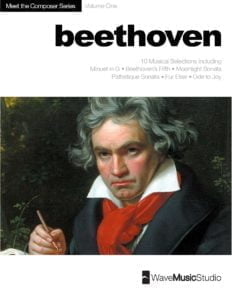 |
Beethoven Piano Book 10 Musical selections |
| Beethoven Piano Concerto 5 Piano Solo Reduction |
 |
|
| Beethoven Piano Concerto No 4 1st Movement (Arr For 2 Pianos) (Musescore File).mscz | ||
| Beethoven Piano Concerto No 4 3rd Mvmt (Arr For 2 Pianos) (Musescore File).mscz | ||
| Beethoven Piano Concerto No 4 Op 58 Piano Solo Reduction |
 |
|
| Beethoven Piano Concerto No 5 (1st Movement) Arr For 2 Pianos (Musescore File).mscz | ||
| Beethoven Piano Concerto No 5 2nd Movement Fragment (Piano Solo) (Musescore File).mscz | ||
| Beethoven Piano Concerto No. 4 1st Movement Arr. For 2 Pianos.mscz | ||
| Beethoven Piano Concerto No. 4 3rd Movement Arr. For 2 Pianos.mscz | ||
| Beethoven Piano Sonata No.17 “tempest” 1st Movt. (Musescore File).mscz | ||
| Beethoven Sonata Op 49 No 2 (Musescore File).mscz | ||
| Beethoven Sonate No 8 “pathétique” Op. 13 1st Movement (Musescore File).mscz | ||
| Beethoven Symphony n.6 F 2H Pauer | ||
| Beethoven Symphony No 5 (1st Movement) Piano Solo (Musescore File).mscz | ||
| Beethoven Symphony No 6 Pastoral (1st Movement) Piano Solo (Musescore File).mscz | ||
| Beethoven Symphony No 6 Pastoral (3rd Movement) Piano Solo (Musescore File).mscz | ||
| Beethoven Symphony No 6 Pastoral (4th Movement) Piano Solo (Musescore File).mscz | ||
| Beethoven Symphony No 6 Pastoral (5th Movement) Piano Solo(1) (Musescore File).mscz | ||
| Beethoven Symphony No 7 (2nd Movement) Piano Solo (Musescore File).mscz | ||
| Beethoven Symphony No 9 (1st Movement) Piano Solo (Musescore File).mscz | ||
| Beethoven Symphony No 9 (2nd Movement-Scherzo) Piano Solo (Musescore File).mscz | ||
| Beethoven Symphony No. 5 (1st Movement) Piano Solo (Musescore File).mscz | ||
| Beethoven Symphony No. 6 Pastoral (2nd Movement) Piano Solo (Musescore File).mscz | ||
| Beethoven Symphony No. 6 Pastoral 2nd Movement (Musescore File).mscz | ||
| Beethoven Symphony No. 7 2nd Movement Piano Solo Arr. (Musescore File).mscz | ||
| Beethoven Symphony No.6 Op.68 piano solo arr. by Liszt |
 |
|
| BEETHOVEN The Complete Variations For Piano Solo |
 |
BEETHOVEN The Complete Variations For Piano Solo_compressed |
| Beethoven Variations and Fugue in E-flat major (Eroica Variations) Op. 35.mscz | ||
| Beethoven Virus Jazz |
 |
|
| Beethoven_Liszt Symphony No. 9 – 1st Movement (S. 464) – Franz Liszt Piano Solo arr.mscz | ||
| Beethoven_Liszt Symphony No. 9 – 2nd Movement (S. 464) – Franz Liszt Piano Solo arr.mscz | ||
| Beethoven_Symphony_No._9_3rd_movement_for_piano_solo.mscz | ||
| Beethoven- Liszt Symphony no. 6 Pastorale piano solo arr. |
 |
|
| Beethoven-Liszt Symphony 9 Choral (arr. for piano) |
 |
|
| Beethoven-Ludwig-van – Sonaten alle complete Band 1 (1-15) |
 |
|
| Beethoven-Ludwig-Van – Sonaten Alle Complete Band 2 (16-32) |
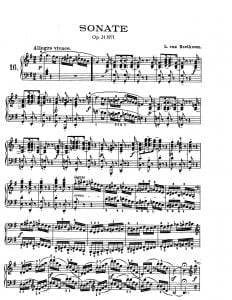 |
|
| Beethoven-Moszkowski – Emperor piano solo Transcription |
 |
|
| Beethoven’s 32 Piano Sonatas A Handbook For Performers (BOOK) |
 |
|
| Beethoven’s Arrangements For Solo Piano Of The 9 Symphonies By E. Pauer |
 |
|
| Beethoven’s Last Piano Sonatas, Piano Sonata In A Major, Op. 101 An Edition With Elucidation, Volume 4 |
 |
|
| Beethoven’s Last Piano Sonatas, Piano Sonata In E Major, Op. 109 An Edition With Elucidation, Volume 1 |
 |
|
| Beetlejuice – Obituaries – Danny Elfman | Beetlejuice – Obituaries – Danny Elfman | |
| Beetlejuice Theme – Danny Elfman |
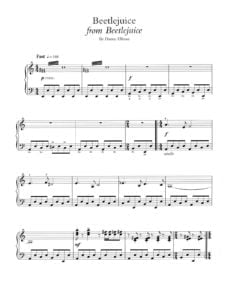 |
|
| Beetoven – Klaviersonate Nr. 14 Mondscheinsonate (Piano Sonata No. 14 Moonlight) 3rd Mov. (Musescore File).mscz | ||
| Beginning Gospel For Piano Easy Piano |
 |
Beginning Gospel For Piano Easy Piano |
| Beginning Jazz Guitar The Complete Jazz Guitar Method by Jody Fisher (with audio MP3 audio tracks and Tablature) |
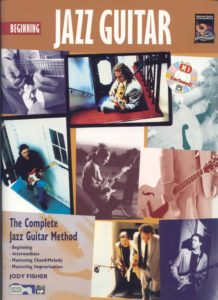 |
Beginning Jazz Guitar |
| Beginning Solo Guitar Merry Christmas with Tablature |
 |
Beginning Solo Guitar Merry Christmas |
| Béla Bartók Romanian Folk Dances Sz. 56 Piano Solo Sheet Music |
 |
|
| Bela Bartok – Music For Strings, Percussion And Celesta Sz. 106 (Piano Transcription) | Bela Bartok – Music For Strings, Percussion And Celesta Sz. 106 (Piano Transcription) | |
| Béla Bartók An Analysis Of His Music (Book) By Ernö Lendvai |
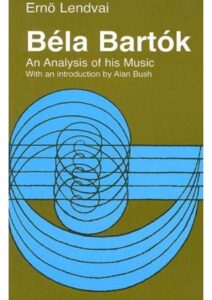 |
|
| Bella Ciao – As Performed In La Casa De Papel (Traditional Italian Anti-Fascist Song) (Musescore File).mscz | ||
| Bella Ciao (As performed in La Casa de Papel – Money Heist) Traditional Italian song (Anti-fascist) | Bella Ciao | |
| Bella Ciao Ukulele with Tablature TABs | Bella Ciao Ukulele with Tablature TABs | |
| Bella gioventù (Renato Zero) | ||
| Bella’s Lullaby (Carter Burwell) | ||
| Belle OST – A Million Miles Away by Rachel Portman |
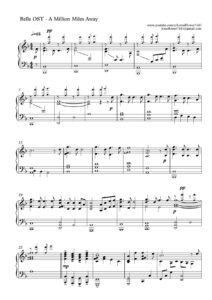 |
|
| Bellini Casta Diva (piano) | Bellini-CastaDiva | |
| Bellini – Casta diva (Norma) Easy Piano Solo arr. |
 |
|
| Bellini – Casta Diva (Norma) Easy Piano Solo Arr. (Musescore File).mscz | ||
| Bellini – Norma Casta Diva arr. piano solo |
 |
|
| Beltrami, Marco – The Giver – Rosemary’s Piano |
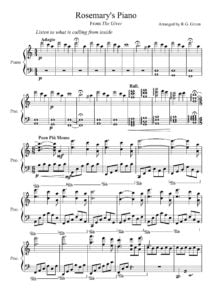 |
|
| Ben (Michael Jackson) | ||
| Ben E King – Stand By Me | ||
| Ben Folds – Annie Waits | ||
| Ben Folds – Brick | ||
| Ben Folds – Carrying Cathy | ||
| Ben Folds – Effington (Solo) |
 |
|
| Ben Folds – Fired | ||
| Ben Folds – Gone | ||
| Ben Folds – Losing Lisa | ||
| Ben Folds – Not The Same | ||
| Ben Folds – Rockin The Suburbs | ||
| Ben Folds – Still Fighting It | ||
| Ben Folds – The Luckiest | ||
| Ben Folds – Zak And Sara | ||
| Ben Harper – Fight For Your Mind (Songbook) (Ben Harper) Guitar TABs |
 |
Ben Harper – Fight For Your Mind (Songbook) (Ben Harper) Guitar TABs |
| Ben Webster – Better Go The Quintet Studio Sessions |
 |
|
| Ben Webster – Solo on Solitude By Duke Ellington | Ben Webster – Solitude By Duke Ellington | |
| Ben Webster – Someone to Watch Over Me The Life and Music of Ben Webster (Jazz Perspectives) (Frank Buchmann-Moller) Book |
 |
|
| Ben Webster Stormy Weather – (solo Tenor Sax)I Cant Get Started | Ben Webster Stormy Weather – (solo Tenor Sax)I Cant Get Started | |
| Benjamin Waldmann Circles |
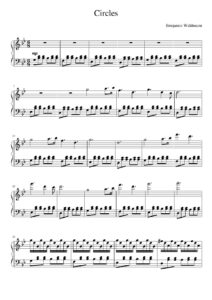 |
